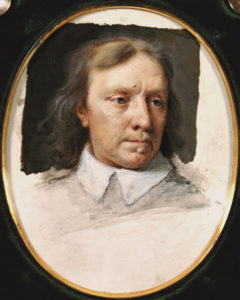Or:
How the Woke monster originated
So far I have collected some passages from the ‘Antiquity’ and ‘Christendom’ sections of Tom Holland’s book. The last section is entitled ‘Modernitas’ and begins with a chapter on Reformed England.
Oliver Cromwell c. 1655 by Samuel Cooper.
In England, where the self-identification of Puritans as the new Israel had fostered a boom in the study of Hebrew, this might on occasion shade almost into admiration. Even before Menasseh’s arrival in London…
The rabbi Menasseh ben Israel travelled from Amsterdam to London to beg that Jews be granted a legal right of residency in England.
…there were sectarians who claimed it a sin ‘that the Jews were not allowed the open profession and exercise of their religion amongst us’. Some warned that God’s anger was bound to fall on England unless repentance was shown for their expulsion. Others demanded their readmission so that they might the more easily be won for Christ, and thereby expedite the end of days. Cromwell, who convened an entire conference in Whitehall to debate Menasseh’s request, was sympathetic to this perspective. Nevertheless, he failed to win formal backing for it. Accordingly—in typical fashion—he opted for compromise. Written permission for the Jews to settle in England was denied; but Cromwell did give Menasseh the private nod, and a pension of a hundred pounds…
The refusal of Cromwell to grant them a formal right of admission prompted missionaries to head for Amsterdam. The early signs were not promising. The Jews there seemed resolutely uninterested in the Quakers’ message; the authorities were hostile; only one of the missionaries spoke Dutch. Nevertheless, it was not the Quaker way to despair. There was, so one of the missionaries reported, ‘a spark in many of the Jews’ bosoms, which in process of time may kindle to a burning flame’…
A second pamphlet, A Loving Salutation to the Seed of Abraham Among the Jews, quickly followed. Anxious to get both tracts into Hebrew, the Quaker missionaries in Amsterdam were delighted to report back to Fell that they had successfully procured the services of a translator. This translator was not only a skilled linguist; he had also been a pupil of none other than Menasseh himself. [pages 372-374]
This Jew was none other than Baruch Spinoza. Protestant Christians were instrumental in reversing the ban on Jews. Soon after, they returned to England.
